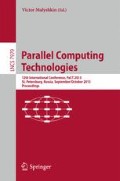Abstract
To remove problematic, high frequency degrees of freedom from a molecular model, modellers often use rigid body dynamics. The method also has additional benefits, for example it allows molecular charge distributions to be conveniently represented by multipolar moments. Rigid bodies are a well established feature within DL_POLY_ Classic (formerly known as DL_POLY_2), which employs the replicated data parallelisation methodology. This paper briefly describes the RB formalism and outlines the strategy for its implementation in DL_POLY_4 (formerly known as DL_POLY_3), which uses a very different form of parallelism, namely domain decomposition.
Access this chapter
Tax calculation will be finalised at checkout
Purchases are for personal use only
Preview
Unable to display preview. Download preview PDF.
References
Ryckaert, J.P., Ciccotti, G., Berendsen, H.J.C.: Numerical integration of the Cartesian equations of motion of a system with constraints: molecular dynamics of n-alkanes. J. Comput. Phys. 23, 327 (1977)
Allen, M.P., Tildesley, D.J.: Computer Simulation of Liquids. Clarendon Press, Oxford (1989)
Andersen, H.C.: Rattle: a velocity version of the Shake algorithm for molecular dynamics calculations. J. Comput. Phys. 52, 24 (1983)
Fincham, D.: Leapfrog rotational algorithms. Molecular Simulation 8, 165 (1992)
Miller, T.F., Eleftheriou, M., Pattnaik, P., Ndirango, A., Newns, D., Martyna, G.J.: Symplectic quaternion scheme for biophysical molecular dynamics. J. Chem. Phys. 116, 8649 (2002)
The DL_POLY Molecular Simulation Package, http://www.ccp5.ac.uk/DL_POLY/
Todorov, I.T., Smith, W.: DL_POLY_3: the CCP5 national UK code for molecular-dynamics simulations. Phil. Trans. Roy. Soc. Lond. A 362, 1835–1852 (2004)
Todorov, I.T., Smith, W., Trachenko, K., Dove, M.T.: DL_POLY_3: new dimensions in molecular dynamics simulations via massive parallelism. J. Mater. Chem. 16, 1911–1918 (2006)
HECToR: UK National Supercomputing Service, http://www.hector.ac.uk/
Author information
Authors and Affiliations
Editor information
Editors and Affiliations
Rights and permissions
Copyright information
© 2013 Springer-Verlag Berlin Heidelberg
About this paper
Cite this paper
Todorov, I., Ellison, L., Smith, W. (2013). Rigid Body Molecular Dynamics within the Domain Decomposition Framework of DL_POLY_4. In: Malyshkin, V. (eds) Parallel Computing Technologies. PaCT 2013. Lecture Notes in Computer Science, vol 7979. Springer, Berlin, Heidelberg. https://doi.org/10.1007/978-3-642-39958-9_40
Download citation
DOI: https://doi.org/10.1007/978-3-642-39958-9_40
Publisher Name: Springer, Berlin, Heidelberg
Print ISBN: 978-3-642-39957-2
Online ISBN: 978-3-642-39958-9
eBook Packages: Computer ScienceComputer Science (R0)

